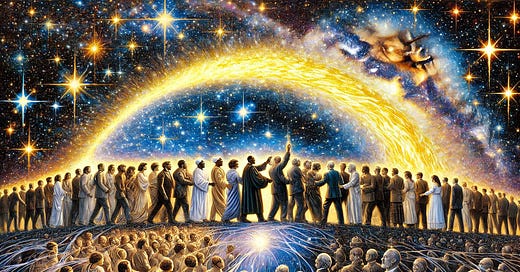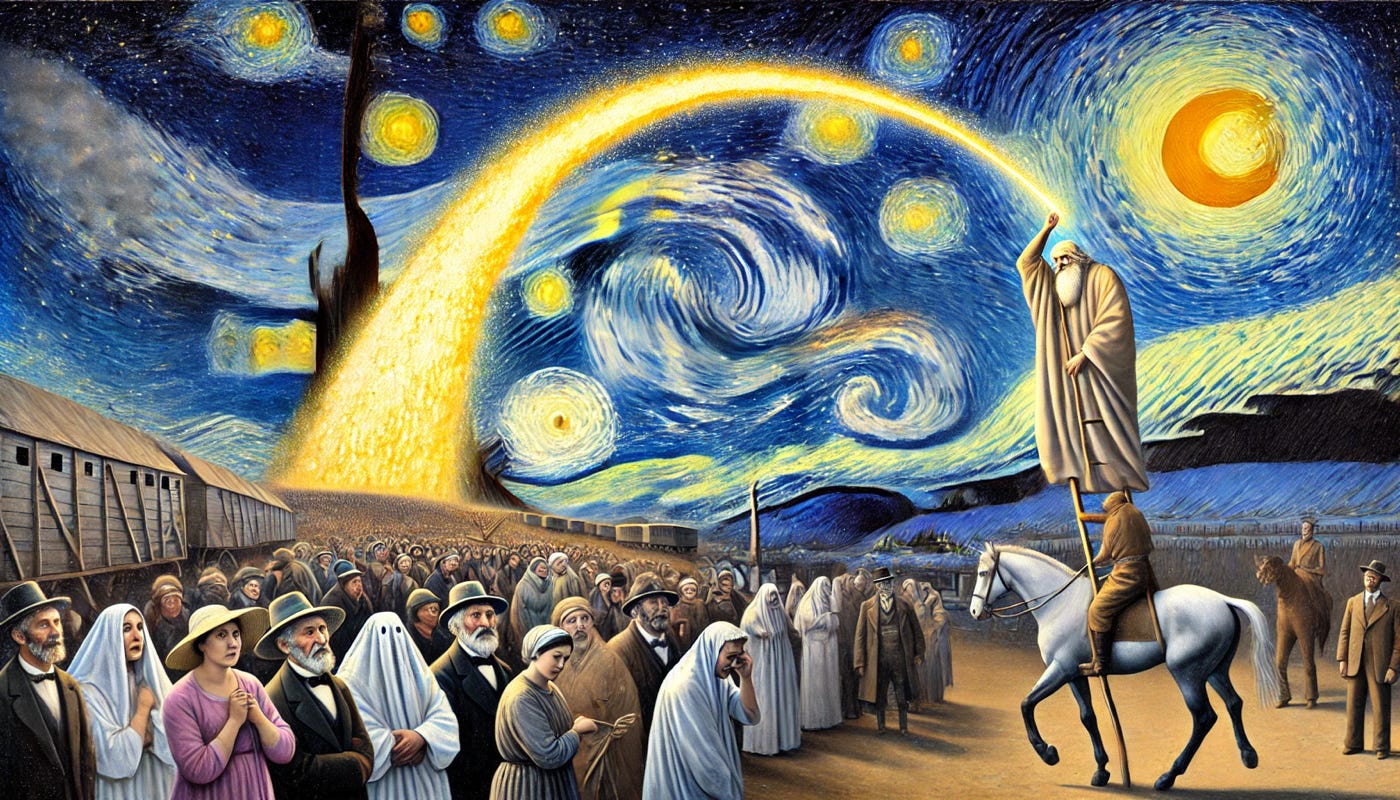“The Silent Weight of Prejudice: Doubt as a Form of Oppression”
MLK talked about the Arc of Moral Universe moving toward justice. I think it needs some bending.
If you believe in the importance of free speech, subscribe to support uncensored, fearless writing—the more people who pay, the more time I can devote to this. Free speech matters. I am a university professor suspended because of a free speech issue, so I am not speaking from the bleachers. The button below takes you to that story.
Please subscribe and get at least three pieces /essays per week with open comments. It’s $6 per month and less than USD 4. I know everyone says hey, it’s just a cup of coffee (with me, not per day but just one per month), but if you’re like me, you go, “Hey, I only want so many cups of coffee!”
But I only ask that when you choose your coffee, please choose mine. Cheers.
_______________________________________________________________________
A black man or a Jew wearing a kippah walks into a liquor store to refund a product. They’re prepared with the receipt and expect a straightforward transaction. Yet, they’re subjected to delays, scrutiny, and dismissive treatment for the next hour. The store clerk never utters a racial slur, nor do they reference the customer’s background. Is the clerk rude and inefficient, or is something more sinister at play? The customer leaves with their refund eventually, but also with a lingering, gnawing doubt:
Was I treated this way because of my race or because they knew I was a Jew?
This experience is far from unique. It illustrates the insidious psychological toll racism and anti-semitism can exact—even when overt hostility is absent. The doubt it seeds forces individuals to grapple with a haunting question: Is this happening because of my skin colour or because they saw my Star of David?
Whether the answer is yes or no, questioning erodes agency; it makes people feel like they are losing control, and that is as bad as the real thing.
This is the fine thread where the suffering of racism tightens its grip, and it is this phenomenon that Diversity, Equity, and Inclusion (DEI) programs often fail to address.
Racism and prejudice divide not only society but also the individual. The persistent question—“Is this happening to me because of my race or my Judaism?”—becomes a mental prison. It forces people to navigate between two untenable options:
Paranoia (non-clinical, but the irrational search for enemies) and bitterness: Assuming racial/other prejudice drives animus in every interaction fosters distrust, resentment, and a sense of helplessness.
Denial and false empowerment: Ignoring the reality of racism places undue weight on the individual, suggesting that systemic issues are mere personal failures.
Even when racism or prejudice is absent, the possibility of its presence burdens the mind. The white individual rarely carries this doubt, enjoying easier access to faith in their agency. For those subjected to racism/prejudice, the doubt wounds; at its extreme, it may temporarily soothe, but it also strips away either autonomy or the perception of autonomy. It doesn’t matter which one - it leaves you in the same spot.
Dr. Martin Luther King Jr. observed, “Nothing in all the world is more dangerous than sincere ignorance and conscientious stupidity.1” Racism thrives in these ambiguities, forcing victims to navigate a minefield of doubt and frustration.
Racism and anti-semitism, by creating doubt, fear, and self-questioning, oppose this divine spirit. But then the music starts up . . .
At this point, the band is here, marching in stride. The white saviours and the racebaiters are all part of the same band, just playing different instruments.
The band is revved up, and the music distracts. The frontman has no baton, just one hand extended, wanting us all to know he is looking to lift someone. His other hand is hard to see, clinging to his side, but it is palm up, looking for a little grease. Behind the man who lost his baton, a choir sings soaring songs about empathy. Woo.
Empathy is overrated.
Empathy is the assumption that you can, based on experience or speculation, understand another person’s feelings, perceptions or attitudes. It is a wonderful idea but exceedingly rare. When gold is mined, the ratio of dross (waste) to gold is extreme: one tonne for one gram of gold. Perhaps the ratio of counterfeit empathy to gold, even if the user does not know it is counterfeit, is equivalent. Empathy often falters under the weight of life’s profoundest pains. At times, it becomes hollow—a performative response to suffering, called false empathy, where the gesture is there but the heart is not. This form of shallow sympathy, devoid of understanding, leaves us more isolated.
No human can truly comprehend our struggles in our loneliest moments. Whether one believes or not, religion and Christianity, in particular, offer something the world cannot: the presence of an all-knowing, all-loving God who understands and enters into our suffering. The atheist says this is foolish, but it is a nice idea.
False empathy often stems from good intentions but falls short of true connection. It arises when someone tries to mirror your emotions without truly understanding the depth of your experience. No matter how well-meaning, this performative act can leave the recipient feeling more isolated. It’s the reason why people say, “You just don’t get it,” even when someone tries their best to console them.
Human empathy is inherently limited. We can’t fully know each other because we are complex genetic creations bombarded with millions of experiential inputs with all their nuances. No one can experience your pain exactly as you feel it, and even those closest to you cannot inhabit your mind, soul, and memories.
Other problems? Self-interest creeps in: As Teju Cole writes in The White Savior Complex, even well-intentioned empathy can become more about the helper than the person in need2. We humans have an infinite capacity for self-delusion. Does the empathiser simply like the dopamine hits they get from telling themselves they are understanding and helping this other person?
To be human is to be lonely; to be human is to carry the burden of isolation. Even surrounded by friends or family, there are moments when we feel profoundly alone—moments when no one else can fully understand our fears, doubts, and pains.
This loneliness isn’t just emotional; it’s spiritual. I remember the hot August day when I scattered my father’s ashes in a gorgeous barley field next to the yellow shack my grandfather had cobbled together and the house my dad had built with his sweat. After the scatterings, some relatives and friends gathered in our small farmhouse. The room was full, and I sat in a generous chair by the fireplace, my arms on the armrests.
What does one do after one has thrown the ashes of your father into a field? The conversation did not differ from any typical living room gathering, but my father was not there. I remember clutching the armrests, grasping for composure, my eyes tracking as the conversational ball was passed from person to person. Perhaps I held the ball for an instant, I can’t recall, but I remember loneliness, the crushing weight, love seemed abandoned; I did not seek empathy, I could not bear a cheap facsimile. I could not have the cut infected by dirty empathy; the infection would have burned red hot.
The Bible acknowledges this universal human experience,
“For we do not have a high priest who is unable to empathise with our weaknesses, but we have one who has been tempted in every way, just as we are—yet he did not sin.3”
The hole is filled through faith. Writer C.S. Lewis wrote in The Problem of Pain:
“God whispers to us in our pleasures, speaks in our conscience, but shouts in our pains: it is His megaphone to rouse a deaf world.4”
Lewis says that God does not empathise; He transforms. He does not merely watch; He redeems.
False empathy leaves us longing for something more, something truer. Empathy risks becoming performative or exaggerated, the “profuse kisses of an enemy.5”
False empathy alienates those it seeks to support, infantilising them rather than fostering empowerment. True progress requires humility, listening, and understanding, not the exaggerated gestures of “white saviours.”
Empathy lies at the heart of DEI efforts, but it has limitations.
Diversity is simply a state of collected differences; it is inert; respect for differences, without embracing the folly of moral relativism, which is no different from amorality, is commendable. Equity searches for identical outcomes and has a foundational presumption that differences in outcome only arise out of prejudice; it is the most cynical and simple-minded of perceptions, the folly that says that one’s position is the result of one or several causative influences called identity, inclusion is shorthand for putting people in positions that they cannot achieve by merit. It creates prejudice by causing everyone to question if that person deserves their position and discriminates against the designated minority who is better than everyone else and shines brightly without the extra wattage of DEI.
White individuals may empathise with feelings of prejudice or powerlessness, but their understanding of racism is inherently secondhand. Someone might say, “I understand what it’s like to feel judged; my family were farmers and called ignorant.”
While such prejudice stings, it is not equivalent to racism. It is also not the pain of the Jew, the smallest of nations, with almost no Jew not generationally touched by the pain of the Holocaust, not just the relatives that never were, but the hatred, the ripple, that today has become a wave; the pain of being hated to the point where some would prefer if you were gone or if ideally that you had never been.
Prejudice based on occupation or background is situational and temporary, while racism, tied to immutable characteristics like skin colour, is omnipresent. Jewishness and the anti-semites (please do not speak of Arabs being Semitic people; anti-semitism is the sole suffering of the Jew) are not always as apparent but run deeper than today’s garden variety racism. Anti-Semitism doesn’t just demean; it ultimately wants dead Jews, and this is no historical reflection. Death to Jews, Heil Hitler, Go back to Europe! They are chanted on the streets of London, Toronto, and Vancouver; you don’t have to go to Tehran.
Like with Nobel prizes, Jews bat above their weight in accumulating threats to their very existence.
But racism is uniquely saddled with the burden of white saviours.
Teju Cole succinctly described the issue in The Atlantic:
“The White Savior Industrial Complex is not about justice. It is about having a big emotional experience that validates privilege.6”
The “white saviour complex” often reduces black communities to passive recipients of charity, reinforcing dependency rather than fostering autonomy. This phenomenon is not limited to individuals; entire industries replicate this dynamic. The strangest phenomenon is that Blacks thrive in areas where white saviours aren’t annoying them with false empathy, denying them agency or extending a hand while ending up grabbing a foot and dragging them around, all the while telling the world how helpful they have been to their poor Black brethren.
History demonstrates that Black excellence flourishes in environments of independence. Some examples:
Fashion: Black designers like Virgil Abloh and Dapper Dan disrupted norms, creating authentic styles. When the mainstream industry embraced these styles, they were often appropriated without credit. True collaboration came only when black creators maintained control.
Sports: Figures like Michael Jordan and Serena Williams excelled not just through talent but by gaining operational control. Jordan’s branding empire exemplifies the power of financial independence.
Music: Genres like jazz, hip-hop, and blues, born in black communities, became global phenomena.
Entrepreneurship: Madam C.J. Walker, America’s first self-made female millionaire, epitomises how independence fosters success. Today, Black-owned tech platforms highlight the move toward self-reliance.
Strangely, though, industries dominated by external “help” often stagnate Black communities.
Education: Schools in Black neighbourhoods often receive top-down policies rather than community-driven reforms.
Carter G. Woodson warned:
“When you control a man’s thinking, you do not have to worry about his actions.7”
In The Danger of a Single Story, Chimamanda Ngozi Adichie noted how oversimplified narratives of African poverty fuel the saviour complex, reducing individuals to victims. As writer Toni Morrison beautifully put it, “If you can only be tall because somebody is on their knees, you have a serious problem.8”
“For the love of money is a root of all kinds of evil.9”
Modern DEI efforts often operate within an industrial complex that profits from the existence of racism. Whether they admit it or not, many in this field are interested in sustaining division. Dr. Martin Luther King Jr. warned, “We must learn to live together as brothers or perish together as fools.10”
If DEI fosters exaggerated victimisation or dependency, it risks doing more harm than good. “Every kingdom divided against itself is brought to desolation.11”
True DEI must navigate the fine line between fostering understanding and undermining agency.
Empowerment Over Aid: Help must amplify, not replace, the agency of Black communities. Maya Angelou said, “I can be changed by what happens to me, but I refuse to be reduced by it.12”
Genuine understanding: Empathy must be rooted in humility and listening, not exaggerated gestures.
Self-determination: History shows that success follows when Black communities control their destiny.
Reject performative activism: “Faith by itself, if it does not have works, is dead.13”
Racism imposes a burden not only through overt actions but also through the psychological toll of constant questioning. DEI must aim to alleviate this burden by fostering understanding without inflating victimisation.
MLK said,
“The arc of the moral universe is long, but it bends toward justice.14”
The arc seems to have been diverted when it comes to the Jews, and that bend for blacks seems more like a straight road where drivers keep missing the justice exit.
The phrase reeks of utopianism and blind faith; it originated with the 19th-century abolitionist Theodore Parker, who wrote, “I do not pretend to understand the moral universe. The arc is a long one… But from what I see, I am sure it bends toward justice.15”
Perhaps Parker was simply talking about the end of chattel slavery in the Americas. Justice doesn’t follow an arc; the most sophisticated nation in the world, the country with the best universities in the world in the 1930s - Germany. And it was the universities that were on the leading edge of Jew persecution.
I was suspended from my university because I said, “I stand with Israel,” and, “If you stand with Hamas, you stand with Nazis.” In contrast, my accuser, whose complaints have been ensconced in that strange exclusive document called a human rights complaint, has, with the top administrator in the university, been embraced and coddled, despite him calling Hamas ‘noble warriors,16’ calling Jews subhuman and calling for the extermination of Israel.17
Justice doesn’t have an arc to fall off if you want to get pedantic, but regardless, the arc’s trajectory is up for debate.
But hear me on this - the only bloody way it gets bent is if we push on it.
It ain’t inevitable. History is not linear. Progress is often accompanied by regression.
Yes, the resurgence of anti-Semitism, along with other forms of hatred, presents a direct challenge to King’s optimism. In the face of rising anti-Semitism and other injustices, we must take the reins of the moral arc and ensure it bends toward justice.
To do so requires faith—not just in God or history, but in our capacity to confront evil, affirm dignity, and create a better world. But we must stop the cowardly silence.
_______________________________________________________________________







